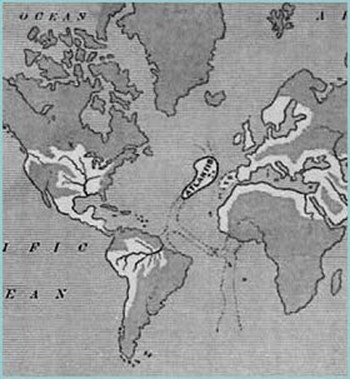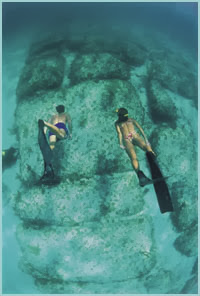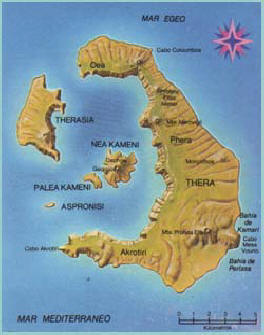The legend tells that Atlantis was an island of great dimensions, could be considered a continent, according to some hypothesis in the Mediterranean, in other versions in the Atlantic Ocean, was destroyed by an earthquake or tsunami that completely flooded their lands leaving it forever submerged under the waters and forgotten in the past.
Its inhabitants possessed a technology and culture far superior to that of the contemporaries of their time and they were decisive in the advances of all the world cultures. Their location allowed them access to cultures as diverse as Egyptian and Maya and were consummate travelers, dominating with their ships all the seas and oceans of the planet. The similarity between architectural structures such as the Mayan and Egyptian pyramids, or the phonetic similarity of some words in cultures separated by waters and thousands of kilometers away, are due to the supporters of the existence of said island or continent and to the influence of the Atlanteans ( name with which habitually it designates to the inhabitants of Atlantis) thanks to its advanced technology they marked cultures of all the world.
Birth and Fall of Atlantis.
The legend of Atlantis starts from Plato around 350 BC, which, in the dialogues Timeo and Critias, tells the story of a flourishing civilization that lived on an island "beyond the columns of Hercules" (ancient name of the Strait of Gibraltar). He claimed to be based on the wise Greek Solon, who 200 years earlier said he had heard in Egypt that an island had been destroyed "to the west" as a result of a great cataclysm that submerged it in the waters in just a few hours. In about 20 pages describes this flourishing culture, its cities and abundances and as due to an affront to the gods (were worshipers of Poseidon) were punished and a series of cataclysms submerged them in the waters.
So far it might seem the typical moralistic history so common in Greek mythology, but many scholars throughout history have sought its real meaning because in many cultures there are myths similar to those of the Atlantis of Plato, according to some of them there is a kind of historical memory or real component in said history and although most of the hypotheses were dismissed for lack of evidence or proved invalidity, it is true that being a legend was very widespread at such an early age of man He lived in different and disparate cultures.
Location of Atlantis.
SOURCE
The romantic image of a fabulous island swallowed by the sea, has meant that its location has been sought since the time of Plato, although no one is sure if there really were many are the researchers who sought it, a company not entirely outlandish, because Finally Homer's Troy was believed to be a product of fantasy, until the archeologist Heinrich Schliemann discovered it in 1903. Suggested locations for Atlantis, include various places below I will list some of the most named locations:
In the Mediterranean Sea - From the story of Plato it can be deduced that the Atlantean civilization must have flourished more than 12,000 years ago. This information can not be accurate in any case, since in those remote times there was still no evolved culture that worked the metals, was ruled by kings and dominated the seas with their boats. As for the location of the mysterious continent, the text of the Athenian philosopher places it "beyond the Columns of Hercules", and this meant, according to the conception of antiquity, on the other side of the Strait of Gibraltar, that is, in the Atlantic Ocean. But pay attention, remember that the fable comes from the ancient Egyptians and, for them, the lost island was called Keftiu (the name they had for Crete). The source of information of Plato, the legislator and statesman Solon, thought naturally in Greek, so that it would translate the indications of the Egyptian priest into his own language, and some misunderstandings could be produced. Possibly the Egyptians had in mind a totally different place from the one referred to by Solon, since for this civilization confined to the Nile valley, the known world ended not only in the Atlantic, but in the Mediterranean itself.
The theory that since 1909 has added more followers affirms that the Atlantis was Crete or another nearby island, that of Santorini. Therefore, the Atlantean civilization would identify with the Minoan. There are many data supporting this thesis. For the ancient Egyptians, Crete was a place of interest because of its closeness and strength, although it was almost inaccessible due to its location in the middle of the Mediterranean. On the other hand, the decline and fall of this civilization fits with the dramatic end described by Plato: around 1500 BC. A tremendous volcanic eruption on the island of Thera (today called Santorini) caused earthquakes, tsunamis and ash showers that ended up giving the coup de grace to that culture of the Bronze Age, which had already suffered previous earthquakes.
The date is the only thing that does not agree, because remember that, according to Plato, Atlantis should have flourished around 12,000 years ago. However, it could happen that the Egyptian informant Solon had based for his calculations on one of the lunar calendars to use at that time, confusing the Greek, who would have taken the lunar years for solar. In such a case, the date referred by the priest would be the year 1200 a.C. approximately, which coincides, admitting a margin of tolerance of two or three centuries, with the explosion of Thera.
In any case, however good this hypothesis may sound - developed and defended above all by the Greek researchers Angelos Galanopoulos and Spyridon Marinatos - it also has its weak points. Thus, the chronological classification of the different ceramic styles of the island of Santorini shows that this culture survived at least fifty years after the eruption of the volcano. Atlantis did not sink, therefore, in this place. And the chances are lower that it was the nearby island of Crete; Knossos, the center of the Minoan culture, did not collapse until a few centuries after the eruption of the volcano and, as we all know, the island is still in place.
DATE: The volcanic eruption of Santorín in 1470 a. JC. He buried the Minoan colony established there. When the volcanic cone collapsed cliffs formed and a bay dotted with islands. Some atlantologists have indicated that the red and black tones of these cliffs correspond to those of the buildings described by Plato, which may be the origin of this confusion.
In the Atlantic Ocean - The story of Plato spoke of a huge island "beyond the columns of Hercules" this data to assume that it should be in the Atlantic Ocean and for centuries researchers of the subject placed it in that location. This theory was totally rejected in 1950 when plate tectonics was demonstrated and it was proved that there were no vestiges of any submerged continent.

Until that theoretical site was proved that it was not correct, researchers like Ignatius Donnelly, who published his book Atlantis: The Antidiluvian World in 1882, work that knew more than fifty editions and served as a starting point for many subsequent theories. Donnelly studied the enigmas of different cultures and elaborated from such mysterious ingredients an irresistible hypothesis: Atlantis was a continent between Europe and America that was submerged and that even came to constitute a land bridge between both worlds.
The main data that would corroborate his theory are the following: the language of the Aztecs has striking similarities with that of the Egyptians. (This is not accurate, say the skeptics, the resemblance comes from a misinterpretation of the signs of Aztec writing). The Egyptians were not the only ones who built pyramids; The ancient Central American peoples also built this type of structure, so there must have been some contact between them. (Nonsense, say the detractors of Donnelly, such an elementary geometric shape can inspire any architect spontaneously, without having to copy from anyone).
Donnelly offered no new evidence of the existence of Atlantis, but a synthesis as brilliant as persuasive of the already existing, using information from fields as diverse as archeology, oceanography, philology, geology, history, mythology, ethnology, zoology and botany to argue the history of Plato and with the intention of demonstrating that without a continent that would have served as a bridge the coincidences that he proposed could not have occurred.

Submarine stone blocks that look like the remains of causeways and walls have led to suppose that the Atlantic is located next to the coast of Bimini one of the Bahamas Islands.
Atlantis in America - When the new continent was discovered, a new theory arose, could it be America, the continent described by Plato? Was it possible that the lands discovered by Cristobal Colon were part of the dream island?
The answer seemed to be no because it seemed very unlikely with the technology of the time that Plato related could be made trips by boat to such a long distance and more when describing fleets of 1200 ships that conquered where they passed with their troops. A data at least curious about this theory is the following:
In a trance session held in 1933, the American seer Edgar Cayce described in a colorful and fantastic way life in that ancient civilization, predicting, in addition, that a part of it would be found in the year 1968. And indeed, a year later than predicted, certain structures apparently made by the human hand were discovered on the seabed in front of the Bahamas. The location of Atlantis in this area had already been proposed by other researchers, who undoubtedly referred to the data provided by the Roman geographer Marcelo, from the first century before our era. According to him, the lost continent would have been composed of seven small islands and three large islands, the largest of them 1,000 stadiums in diameter, which is approximately 200 kilometers.
Should we, then, look for the remains of Atlantis in the Caribbean? The largest of the Antillean islands, Hispaniola, has a size that coincides more or less with that calculated by the wise Marcelo. However, these speculations have very little to do with Plato's description. The stone formations found are, according to the experts, just an unusual rock formation and have nothing to do with the hand of man and even in the case of being architectural structures created by man it seems very unlikely that they belonged to the Atlantis that recounted Plato and almost certainly would be part of a still unknown megalithic culture.
Conclusions
Plate tectonics leaves no room for doubt, there is no place for Atlantis, no continent or island of dimensions such as those described could have been submerged or flooded without leaving evidence of it. For which we have to think that to be something more than a myth we should look for Atlantis among the already known lands, probably a Mediterranean island, some European region that was misinterpreted in the maps or translations of ancient texts, other hypotheses consider the possibility that it was the Azores and even in Sweden.
Even so it is fascinating as for centuries an idyllic continent has been sought and there are so many texts throughout history providing evidence of its existence.


Peace, Abundance, and Liberty Network (PALnet) Discord Channel. It's a completely public and open space to all members of the Steemit community who voluntarily choose to be there.Congratulations! This post has been upvoted from the communal account, @minnowsupport, by Isaiasg18 from the Minnow Support Project. It's a witness project run by aggroed, ausbitbank, teamsteem, theprophet0, someguy123, neoxian, followbtcnews, and netuoso. The goal is to help Steemit grow by supporting Minnows. Please find us at the
If you would like to delegate to the Minnow Support Project you can do so by clicking on the following links: 50SP, 100SP, 250SP, 500SP, 1000SP, 5000SP.
Be sure to leave at least 50SP undelegated on your account.